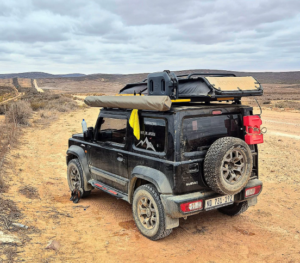Media personality Tahiya Moosa joined 18 other South Africans on a trip to Palestine. Here she recounts the highlights of her experience.
Palestine, the word we hear on the news, the people who are suffering or the land that has systematically been confiscated and occupied. These are just a few of the things that come to mind when you think of Palestine. But, to say that this is the extent of what Palestine represents, is grossly incorrect. Palestine represents the sounds of the old city, the smells of fresh bread and hummus and most importantly the strength of the human spirit.
This year a team of 19 people made the trip to Palestine for the 2019 Palestine Marathon, held in Bethlehem. Amongst the team were a handful of medical doctors, students, and other professionals. For some, this was their first journey to the ‘Promised Land’, and for others they would be returning after years.
For most, the Amman-‘Israel’ border crossing was a breeze. For the youngest member of our team, it was much more difficult. This was perhaps the first chance for the entire team to be exposed to the harsher day-to-day realities of the occupation, being held for hours, without a passport and without any indication of why or how long you will be waiting for.
On arrival in Al-Quds City (Jerusalem), the first thing on the agenda was to visit the Al-Aqsa compound. This would be the first visit for many of our team members, and it was certainly a memorable one. As you walk through the busy streets of the old city, passing armed Israelis soldiers on the way, you begin to fully understand the greater paradox that exists in this country. How can the road leading to a place of peace and worship, like Al-Aqsa, be paved with armed soldiers, on the prowl, waiting to interfere or stop you from reaching your destination?
As you approach the large archway entrance to al Al-Aqsa, you are stopped by one of these soldiers… “Muslim?”… “Read Al Fatiha”… “Let me see your passport!”. These are generally the more basic questions you get asked, as a foreigner, a grim reminder of the extreme conditions faced by Palestinians simply wishing to pray, on a day to day basis.
Al Quds acts as a strong reminder of the realities of the occupation, armed soldiers on every corner, Palestinians trying to go about their day and an indescribable tension in the air that never goes away.
As the week progressed, we crossed the nefarious wall of separation, moving into the West Bank, visiting cities and refugee camps. Our first stop was Hebron, known for being the city most affected by Israel’s illegal settlements. Hebron is home to around 200,000 Palestinians and a whopping 800+ settlers living under Israeli protection. These settlers reside in heavily fortified compounds in the heart of the city. In reality what this means is that Palestinian homes are being encroached upon by growing Israeli settlements situation around, next to and on top of their homes, creating unlivable conditions ripe for hostility and violent interactions.
In the next few days we were privileged to visit an organization called Wafaa in Ramallah. Wafaa is dedicated to empowering smaller and more vulnerable people and communities in the West Bank. After visiting Kalandia Refugee Camp, near the main checkpoint between Ramallah and Jerusalem and next to the West Bank Barrier, the team was able to get a better understand of life in a Palestinian refugee camp, and the lack of resources and funding going towards helping these defenseless people.
Opportunity
For many of our team, this was the first time they had seen the extent of generations of displaced Palestinians, having been forcibly removed from their land and their homes and forced to live in somewhat informal settlements. This was something that hit home quite strongly for most of us, having lived through Apartheid.
By the end of the week our team was ready to head to Bethlehem as we began to get excited for the upcoming Marathon, being held on the 22nd of March. The aim of this marathon was to focus the lens on the basic right to move freely in Palestine, with the hash tag #RunForFreedom being used.
The event attracted thousands of people, from all over the West Bank, Jerusalem and abroad, with over 8000 runners from around 52 different countries, showing their support. For many foreigners, this event gave them the opportunity to visit Palestine whilst also exposing them to the conditions Palestinians are living in. According to the UN, there are over 500 obstacles including checkpoints, roadblocks and earth mounds, across West Bank roads, restricting Palestinian movement. To complete the 42km race, runners had to complete two loops of the same route to avoid any encounters with Israeli military checkpoints or settlements. For us this really brought the realities of this occupation home on a very real level.
One of the hardest things to come to terms with was the fact that many Palestinians cannot participate in this event as the Gaza Strip remains under siege by the Israeli government. Every year, minimal permits are issued and countless Palestinian refugees can’t visit due to Israeli restrictions.
The race itself was both breathtaking and harrowing. Runners were taken along the wall of separation and down through Aida refugee camp, one of the most vulnerable and most teargased camps in the West Bank. Runners were made to run across the wall that separates generations of families and communities. This was juxtaposed by the sounds of the Oud being played, young children doing the Dabke in the streets and many local faces cheering us on. The streets were filled with love, joy and an overwhelming sense of togetherness, transcending all borders and nationalities.
What a paradox I remember thinking. “How is there so much joy within such devastating conditions?” And then, it occurred to me and to us all, what stood out most during this Marathon and throughout our entire experience in Palestine was one thing: The strength of the Palestinian people and the fact that no wall or occupation can crush their spirit; this is their land and they will not give up until Palestine is free, once again.
The South African Team dedicates their run in the 2019 Palestine Marathon to the lives lost in the New Zealand shooting, the men, women and children of Bethlehem and to the people of Palestine.
For more information about the Palestine Marathon visit http://www.palestinemarathon.org


